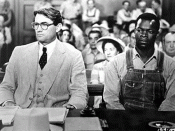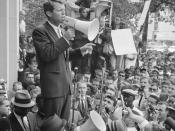Chapter twenty portrays Atticus's plea to the jury to do their sworn duty, toss aside their predetermined views, and take account all the evidence present in order to free Tom Robinson. However, I do not understand why Atticus is trying to persuade the jury with his speech, even though he knows that it is hopeless to save Tom Robinson. In spite of this, I can make inferences and use the subtle clues provided in the text to answer my questions.
Atticus appeals to the jury's sense of dignity, and in putting together the facts of the case, he stresses the simplicity of the evidence and shows that the facts point toward Tom's innocence. Atticus doesn't really believe that the jury will set Tom free, even though he does hope that they will, as shown by the way he says "In the name of God, believe him," under his breath at the end of his speech.
All he can hope for is to leave an impression upon the town by exposing the truth for all to see. He hopes that by exposing the jury to his beliefs, he will instil those beliefs upon them so that they can also become individuals supporting racial equality in Maycomb's society. Additionally, through Atticus's speech, he may be trying to persuade Mayella to confess that her father actually committed the crime. Atticus remarks "I have nothing but pity in my heart for the chief witness for the state, but my pity does not extend so far as to put a man's life at stake, which she has done in an effort to get rid of her own guilt (206)." By saying this, Atticus is telling Mayella that he has sympathy for her and it is alright if she confesses, for she won't...


